01 - Women's Participation in Pakistan's National Assembly Elections: A Historical Re...
http://dx.doi.org/10.31703/gpr.2022(VII-I).0110.31703/gpr.2022(VII-I).01 Published : Mar 2022
-
This article aims to discuss women's political participation in the context of the country's electoral history. Additionally, it discusses barriers that have had an unembellished consequence on women's participation in the elections in the past. Women's representation in legislatures remained low, which led to the absence of their voices in the political affairs of the country. Gender and politics... Details
-
Elections, Political Participation, Gender and Politics, Female leaders, and Political Affairs
-
(1) Sher Muhammad
DAAD Postdoctoral Fellow, The Center for Transdisciplinary Gender Studies (ZtG), University of Humboldt Berlin, Germany
(2) Quratull ain Abbas
Lecturer, Department of Government and Public Policy, National Defence University, Islamabad, Pakistan.
(3) Muhammad Waris
Assistant Professor, Department of History, Government College University Faisalabad, Punjab, Pakistan.
02 - Economic Strategies of Pakistan Muslim League (N): An Analysis 2013-18 ...
http://dx.doi.org/10.31703/gpr.2022(VII-I).0210.31703/gpr.2022(VII-I).02 Published : Mar 2022
-
The PML-N's (2013) Government witnessed a rapid change in the economy as several economic strategies were implanted in different ways. The study will focus on monetary policy, public debts, and loan records taken either locally or internationally. Some works enriched the position of the economy by making loans to some extent, but loans played a weak role in the economy of Pakistan generally. Quali... Details
-
Economic Strategies, Pakistan Muslim League, PML-N, Nawaz Sharif
-
(1) Hamid Iqbal
PhD Scholar, Department of History, Government College University Faisalabad, Punjab, Pakistan.
(2) Muhammad Usman
PhD Scholar, Department of History, Government College University Faisalabad, Punjab, Pakistan.
(3) Muhammad Nawaz Shahzad
Visiting Lecturer, Department of Pakistan Studies, Government College University Faisalabad, Punjab, Pakistan.
03 - News Discourse on CPEC and Challenges for Civil-Military Relations...
http://dx.doi.org/10.31703/gpr.2022(VII-I).0310.31703/gpr.2022(VII-I).03 Published : Mar 2022
-
The China-Pakistan Economic Corridor (CPEC), a multi billion-dollar infrastructure investment project, is heralded as a game-changer for sustainable development and democratic consolidation in Pakistan. However, the implementation of such a mega project came with a lot of challenges. Among all, the major challenges were balanced civil-military relations, peace, and revised policy with Afghanistan.... Details
-
CPEC (China- Pakistan Economic Corridor), Civil-Military Relations (CMR), Discourse Analysis, COAS (Chief of the Army Staff)
-
(1) Amna Zulfiqar
Assistant Professor, Department of Media and Communication Studies, National University of Modern Languages, Islamabad, Pakistan.
(2) Noor Ul Ain Nasir
Lecturer, School of Media and Communication Studies, University of Management and Technology, Lahore, Punjab, Pakistan.
(3) Maria Khalid
PhD Scholar, Visiting Lecturer, Department of Media and Communication Studies, International Islamic University Islamabad, Pakistan.
04 - The Structure of Governance, Rise of Taliban Militancy and Human Displacement. A...
http://dx.doi.org/10.31703/gpr.2022(VII-I).0410.31703/gpr.2022(VII-I).04 Published : Mar 2022
-
This paper explores the nexus between governance crisis,militancy and how people resort to different migration patterns in order to cope with the unwanted situation. It suggests that the transition from one system of governance to another was not only incomplete but full of confusion and lacunas. This resulted in people's reduced trust in the state institutions. As the vacuum was created,non-state... Details
-
Taliban, Human Displacement, Swat, Governance Crisis, Pakistan
-
(1) Sanaullah
Demonstrator, Department of Political Science, Abdul Wali Khan University Mardan, KP, Pakistan.
(2) Yunas Khan
Assistant Professor, Department of Pakistan Studies, Islamia College University, Peshawar, KP, Pakistan.
(3) Mubasher Hassan
University of Peshawar, KP, Pakistan.
05 - Traditional Water Fetching Practices, Water Usage, and Scarcity...
http://dx.doi.org/10.31703/gpr.2022(VII-I).0510.31703/gpr.2022(VII-I).05 Published : Mar 2022
-
This study analyzes the traditional water fetching practices,water usage, and scarcity in the Village Kumar Bandi Muzaffarabad.Overall, 93 respondents of the local community of Kumar Bandi were approached. Data has been collected through an interview guide by convenient and purposive sampling. A descriptive model of data collection has been used for acquiring the information. The study draws essen... Details
-
Experiences, Maternal child health, Perceptions, Psychological stress, Water fetching, Water Scarcity, Water stress.
-
(1) Aleena
MPhil Scholar, Department of Anthropology, Quaid e Azam University, Islamabad, Pakistan.
(2) Aneela Sultana
Assistant Professor, Department of Anthropology, Quaid e Azam University, Islamabad, Pakistan.
06 - Reviewing Power Politics and Populism in IK's Pakistan: A Personal History ...
http://dx.doi.org/10.31703/gpr.2022(VII-I).0610.31703/gpr.2022(VII-I).06 Published : Mar 2022
-
This paper aims to explore the structural ways employed by a Pakistani politician to convince the readers of his socio-political stance on Pakistan from its independence to the present age. For this purpose, the generic analysis (Martin, 2008) has been employed which in turn explains how a narrator is successful in the construction of an argument and realigning the reader with his own point of vie... Details
-
Power Politics, Populism, Imran Khan, Pakistan
-
(1) Tazanfal Tehseem
Assistant Professor, Department of English, University of Sargodha, Sargodha, Punjab, Pakistan
(2) Saba Zulfiqar
Lecturer, Department of English, University of Lahore, Lahore, Punjab, Pakistan.
(3) Rabia Faiz
Assistant Professor, Department of English, University of Sargodha, Sargodha, Punjab, Pakistan.
07 - Women's Activism and Pakistani State Policies: A Comparison of Benazir Bhutto an...
http://dx.doi.org/10.31703/gpr.2022(VII-I).0710.31703/gpr.2022(VII-I).07 Published : Mar 2022
-
The purpose of this article is to trace the history of women's activism in Pakistan, as well as the policies of the Pakistan People's Party and Pakistan Muslim League (N) Governments (1988-1999). This period after the revival of democracy following the military government is significant in understanding women's activism as well as the policies of two prime ministers with diametrically opposed ideo... Details
-
Women's Activism, Democracy, Power Structure and Historical Analysis
-
(1) Sher Muhammad
DAAD Postdoctoral Fellow, The Center for Transdisciplinary Gender Studies (ZtG), University of Humboldt Berlin Germany.
(2) Sajida Feroze
Lecturer Political Science, Government Associate College for Women Phularwan, Sargodha, Punjab, Pakistan.
(3) Sidra Mubashar
M.Phil Scholar, Department of Pakistan Studies, Government College University, Faisalabad, Punjab, Pakistan.
08 - Problems Faced by Visitors in Pakistan: A Case Study of Kaghan Valley, Mansehra ...
http://dx.doi.org/10.31703/gpr.2022(VII-I).0810.31703/gpr.2022(VII-I).08 Published : Mar 2022
-
Pakistan is one of the most beautiful countries in the world and has enormous potential to attract a maximum number of visitors who are eager to satisfy their diverse motivations. Kaghan valley being the northern part of the Khyber Pakhtunkhwa province of Pakistan, is one of the most beautiful valleys and hill stations in the country. It is an emerging and one of the most significant destinations ... Details
-
Tourism, Pakistan, Kaghan Valley, Visitors, Problems, Sustainable Tourism
-
(1) Anas Mahmud Arif
Assistant Professor, Department of Tourism and Hospitality, Hazara University, Mansehra, KP, Pakistan
(2) Abdul Hameed
Assistant Professor, Department of Archaeology, Hazara University, Mansehra, KP, Pakistan
(3) Adnan Anwar
Assistant Professor, Department of Architecture, Hazara University, Mansehra, KP, Pakistan
09 - Analysis of Awami National Party's Theory and Practice During its Rule in Khyber...
http://dx.doi.org/10.31703/gpr.2022(VII-I).0910.31703/gpr.2022(VII-I).09 Published : Mar 2022
-
In Pakistan, the political parties, during their election campaigns, present their manifestoes with a promise to solve the multiple issues and problems of the people. However, after winning elections, either due to hurdles within the existing system or inefficiency and incompetency of political parties, those promises are not fulfilled. Awami National Party, as a political party, also promised man... Details
-
Analysis, Autonomy, Elections, Manifesto, Practice, Terrorism, Theory
-
(1) Safi Ullah Khan Marwat
Assistant Professor, Department of History and Pakistan Studies, International Islamic University, Islamabad, Pakistan.
(2) Sadia Kousar
MS in Pakistan Studies, Department of History and Pakistan Studies, International Islamic University, Islamabad, Pakistan.
(3) Shafaeen Latif
M.Phil Scholar, Department of Pakistan Studies at National Institute of Pakistan Studies (NIPS), Quaid-i-Azam University (QAU), Islamabad, Pakistan.
10 - US-Taliban Peace process: Post-Withdrawal Scenarios ...
http://dx.doi.org/10.31703/gpr.2022(VII-I).1010.31703/gpr.2022(VII-I).10 Published : Mar 2022
-
Afghanistan encountered a US-led invasion in 2001 in response to the 9/11 attacks and ended the Taliban's government in Afghanistan. Thousands of US troops were deployed on Afghan territory in the war against terrorism to direct anti-terrorism operations in Afghanistan and to contain Talibanization. Thus, the immediate objective of the US invasion of Afghanistan was to prevent the country from ter... Details
-
Afghanistan, US, Taliban, US Troops, NATO, Peace Process, Withdrawal
-
(1) Javeria Noor Sawal
Visiting Lecturer, Department of Political Science, Government Post Graduate College, Charsadda, KP, Pakistan
(2) Anfal Afridi
Lecturer, Department of Political Science, Women University Mardan, KP, Pakistan.
(3) Ruqaiya Bibi
BS Honors Graduate, Department of Political Science, Women University Mardan, KP, Pakistan
11 - [Be]Longings: Exploring Emotional Territories of Home, Desire and Identity in Sh...
http://dx.doi.org/10.31703/gpr.2022(VII-I).1110.31703/gpr.2022(VII-I).11 Published : Mar 2022
-
The present article is an exploration of ShamsieâÃâ¬Ãâ¢s Home Fire (2017). Contextualized in the theoretical narratives of Islamophobia and postcolonial studies, the present paper is based on a qualitative analysis of the selected textual lines to reveal the struggles inherent in the minds and hearts of second and third-generation colonial subjects. The characters desire to be ... Details
-
Islamophobia, British Muslims, Diaspora Literature, Identity Crisis, Desire
-
(1) Fariha Chaudhary
Assistant Professor, Department of English, Bahauddin Zakariya University, Multan, Punjab, Pakistan
(2) Maimoona Khan
Associate Professor, Department of English, Women University, Multan, Punjab, Pakistan.
12 - Political Communication of Politicians on Social Media: An Analysis of Party Lea...
http://dx.doi.org/10.31703/gpr.2022(VII-I).1210.31703/gpr.2022(VII-I).12 Published : Mar 2022
-
Political leaders utilize social media as a new means of communicating with their constituents and supporters. It provides political leaders with a platform to communicate with the general public on a large scale. It is imperative to study this usage of Twitter. For this purpose, three political leaders from leading political parties of Pakistan (PML-N, PPP and PTI) have been selected to investiga... Details
-
Political leaders, Social Media, Political Communication, Twitter, Pakistan
-
(1) Ayesha Qamar
Assistant Professor, Department of Communication and Media Studies, Fatima Jinnah Women University, Rawalpindi, Punjab, Pakistan.
(2) Malik Adnan
Assistant Professor, Department of Media Studies, The Islamia University of Bahawalpur, Punjab, Pakistan.
(3) Zaneera Malik
Lecturer, Department of Media Studies, Iqra University, Islamabad, Pakistan.
13 - Politics of Alliance in Pakistan: A Case Study of MQM (1985-1999) ...
http://dx.doi.org/10.31703/gpr.2022(VII-I).1310.31703/gpr.2022(VII-I).13 Published : Mar 2022
-
The purpose of this study is to make a case study of alliance politics practiced by MQM, a major political party in Sindh, which always remained in coalition to become a part of the government. The politics of alliance formation has remained a regular feature of politics in Pakistan since its inception. Several political alliances were formed in order to achieve the goals of power politics. MQM is... Details
-
MQM, Alliance Formation, Political Parties, Government, Coalition
-
(1) Rehana Iqbal
PhD Scholar, Department of History and Pakistan Studies, University of the Punjab, Lahore, Punjab, Pakistan
(2) Muhammad Iqbal Chawla
Former Dean Faculty of Arts and Humanities, University of the Punjab, Lahore, Punjab, Pakistan
(3) Naumana Kiran
Professor, Pakistani Study Centre, University of the Punjab, Lahore, Punjab, Pakistan.
14 - Feudalism, Factionalism and the Muslim Politics in Punjab during 1937 Elections ...
http://dx.doi.org/10.31703/gpr.2022(VII-I).1410.31703/gpr.2022(VII-I).14 Published : Mar 2022
-
Indian Punjab was a Muslim majority province with a feudal dominant political base. The Unionist party was organized by Sir Fazl-i-Husain to incorporate the powerful elite into a single party without communal distinction. The party had the majority of the Muslim landed elite with consistent egoistic rivalries over personal clashes. The other contenders were Indian National Congress, All India Musl... Details
-
Unionists, Feudalism, Landed Elite, Communal Politics, Ahrars, League, Ittehad-i-Millat, Fazl-i-Husain, Sikander Hayat
-
(1) Shahzad Qaisar
QaisarAssistant Professor, Department of Pakistan Studies and History, National University of Modern Languages, Islamabad, Pakistan.
15 - The Structure of Social Contract in the United States of America: Representative...
http://dx.doi.org/10.31703/gpr.2022(VII-I).1510.31703/gpr.2022(VII-I).15 Published : Mar 2022
-
The constitutional system in the United States of America has maintained a systematic balance between its federal character, separation of powers and distribution of autonomy.The power of the Center over component and subordinated institutions has been ensured through a combination of the constitutional system as well as a bipartite political system. Ironically, the bipartite system's one weakness... Details
-
Social Contract, Separation of Powers, Structuralism, Functionalism, Corporate Elite
-
(1) Ahmed Ijaz Malik
Assistant Professor, School of Politics and International Relations, Quaid-i-Azam University, Islamabad, Pakistan.
(2) Tahir Ahmad
PhD Scholar, School of Politics and International Relations, Quaid-i-Azam University, Islamabad, Pakistan.
16 - Socio-Political Contribution of Sir Agha Khan III for Indian Muslims: An Overvie...
http://dx.doi.org/10.31703/gpr.2022(VII-I).1610.31703/gpr.2022(VII-I).16 Published : Mar 2022
-
Sir Sultan Muhammad Shah Aga Khan III, a renowned Muslim leader, was instrumental in the freedom movement in Pakistan and provided significant support for Muslims in India. He was ideally positioned to play a big role in the international affairs of his time because of his extensive understanding of several cultural traditions, and his long public career had numerous facets. This study examines th... Details
-
Sir Aga Khan III, Indian Muslims, Social Reforms, Women Education, Pakistan Movement
-
(1) Shaista Gohar
Lecturer, Department of Pakistan Studies, Abdul Wali Khan University Mardan, KP, Pakistan.
(2) Yunas Khan
Assistant Professor, Department of Pakistan Studies, Islamia College University Peshawar, KP, Pakistan.
(3) Shazia Noareen
District Education Officer (DEO), Literacy Department, Lodhran, Punjab, Pakistan

 Volume XI, Issue I (Winter 2026)
Volume XI, Issue I (Winter 2026)  Volume X, Issue IV (Fall 2025)
Volume X, Issue IV (Fall 2025) 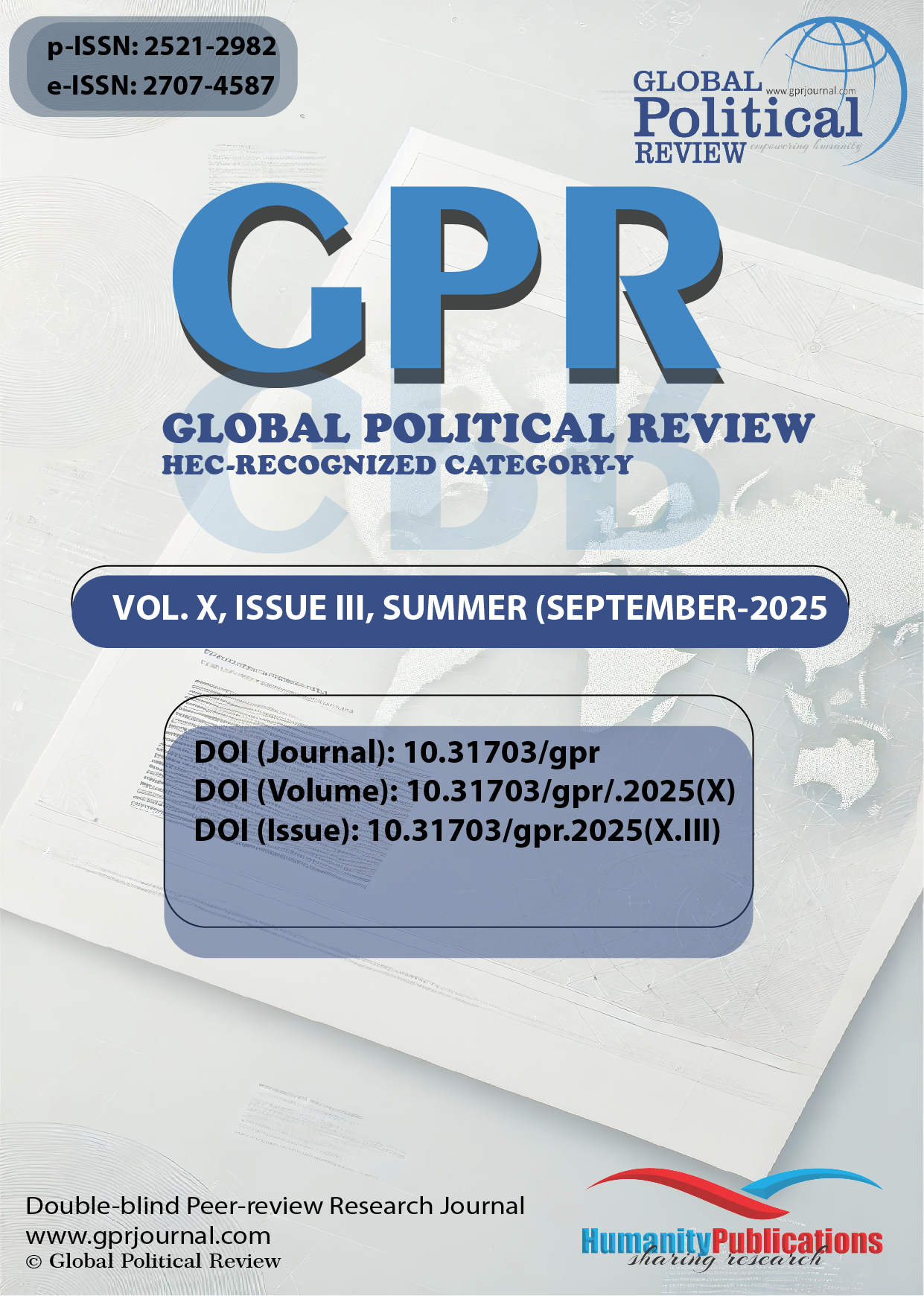 Volume X, Issue III (Summer 2025)
Volume X, Issue III (Summer 2025) 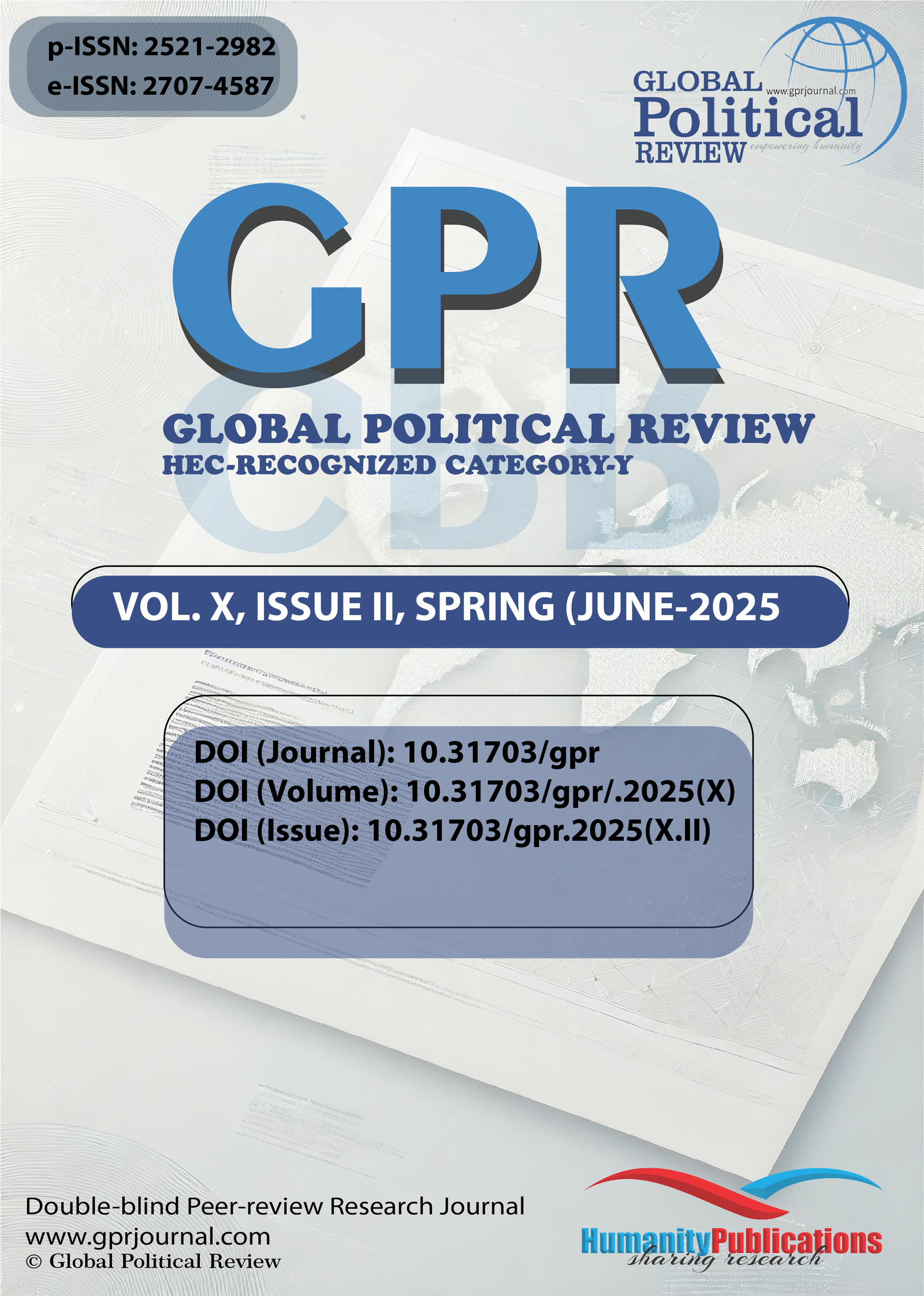 Volume X, Issue II (Spring 2025)
Volume X, Issue II (Spring 2025)  Volume X, Issue I (Winter 2025)
Volume X, Issue I (Winter 2025)  Volume IX, Issue IV (Fall 2024)
Volume IX, Issue IV (Fall 2024)  Volume IX, Issue III (Summer 2024)
Volume IX, Issue III (Summer 2024)  Volume IX, Issue II (Spring 2024)
Volume IX, Issue II (Spring 2024)  Volume IX, Issue I (Winter 2024)
Volume IX, Issue I (Winter 2024) 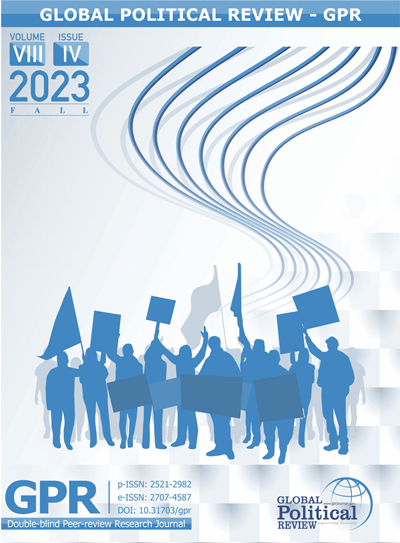 Volume VIII, Issue IV (Fall 2023)
Volume VIII, Issue IV (Fall 2023)  Volume VIII, Issue III (Summer 2023)
Volume VIII, Issue III (Summer 2023)  Volume VIII, Issue II (Spring 2023)
Volume VIII, Issue II (Spring 2023) 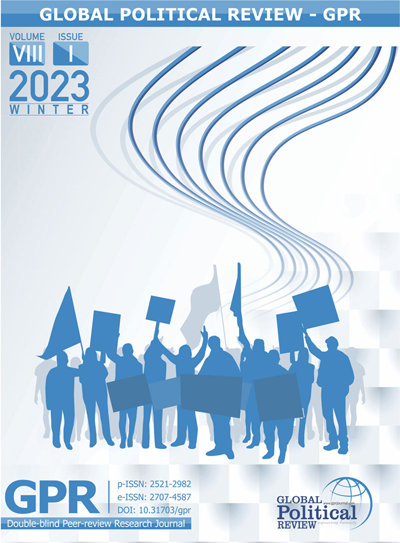 Volume VIII, Issue I (Winter 2023)
Volume VIII, Issue I (Winter 2023) 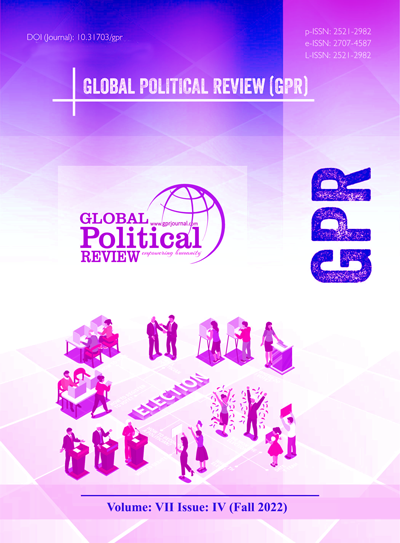 Volume VII, Issue IV (Fall 2022)
Volume VII, Issue IV (Fall 2022)  Volume VII, Issue III (Summer 2022)
Volume VII, Issue III (Summer 2022)  Volume VII, Issue II (Spring 2022)
Volume VII, Issue II (Spring 2022)  Volume VII, Issue I (Winter 2022)
Volume VII, Issue I (Winter 2022) 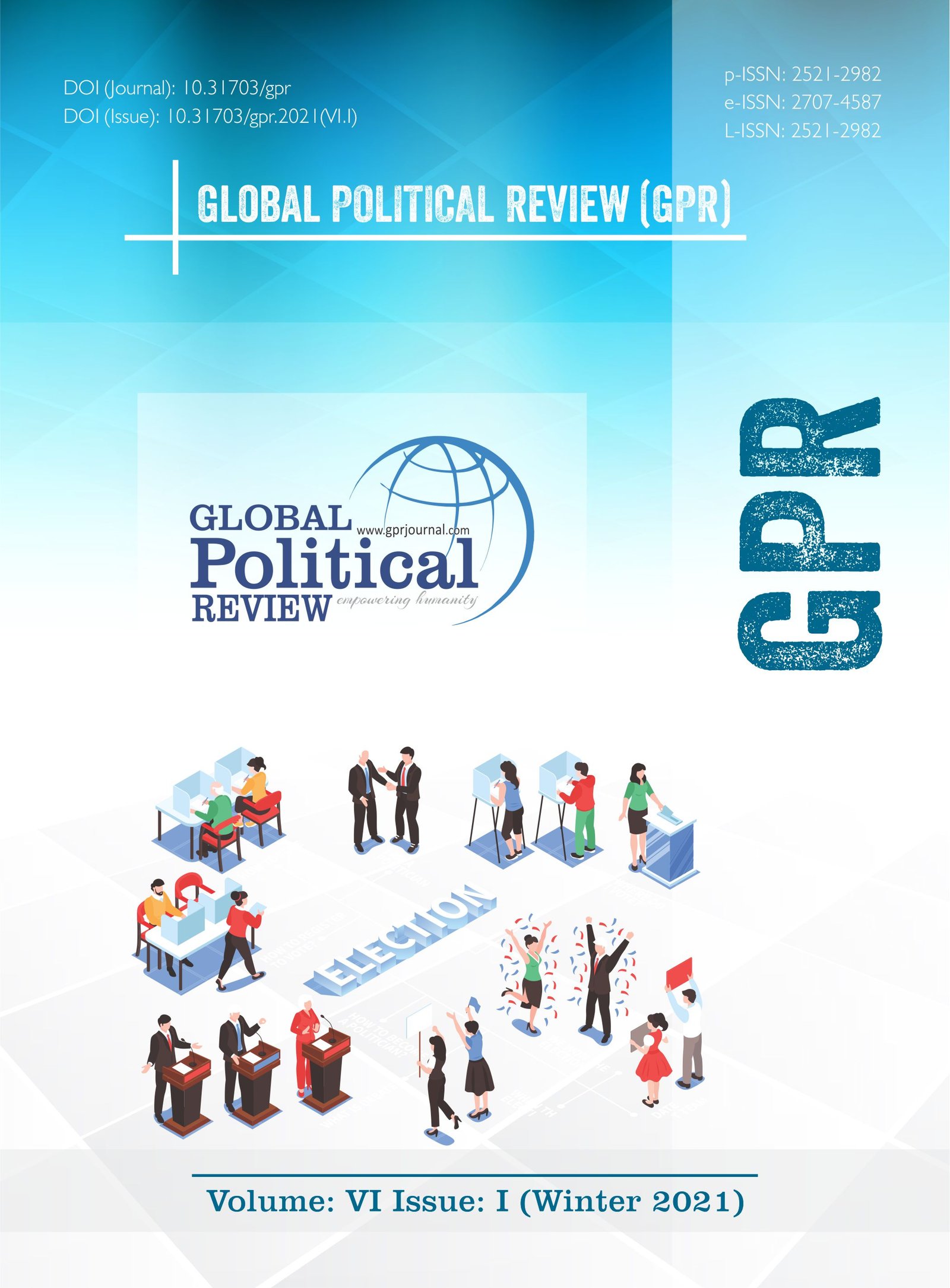 Volume VI, Issue IV (Fall 2021)
Volume VI, Issue IV (Fall 2021) 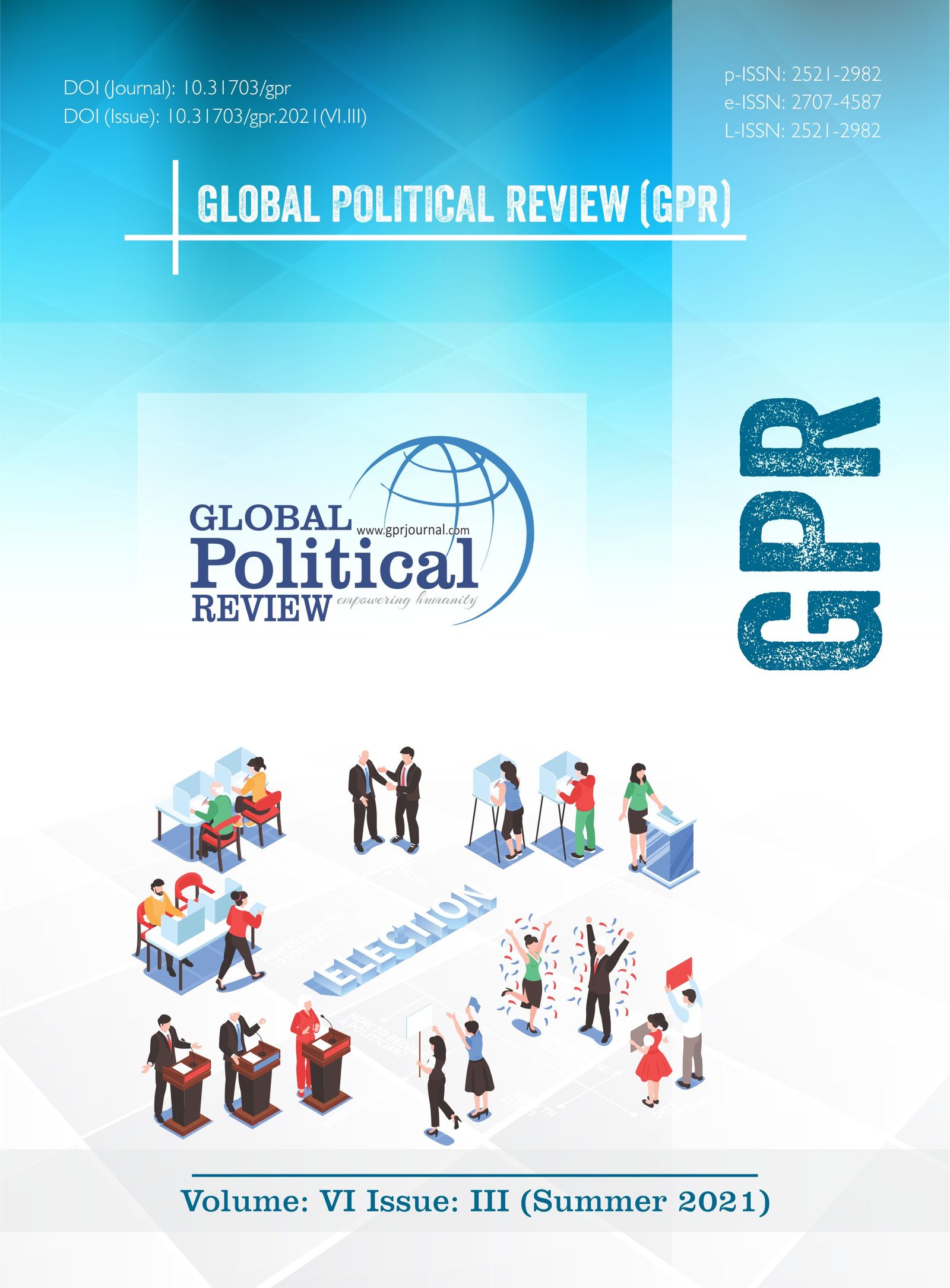 Volume VI, Issue III (Summer 2021)
Volume VI, Issue III (Summer 2021)  Volume VI, Issue II (Spring 2021)
Volume VI, Issue II (Spring 2021) 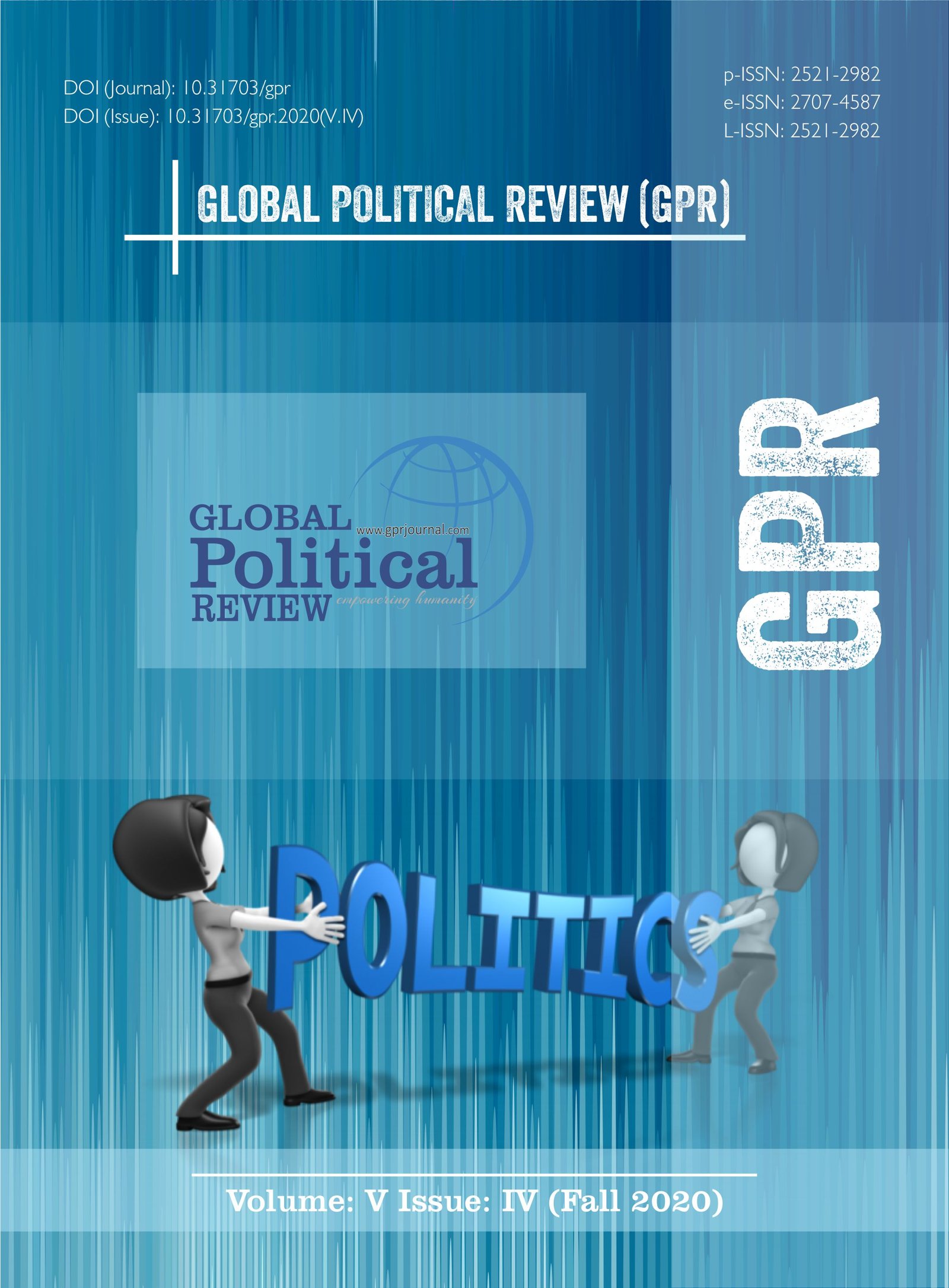 Volume V, Issue IV (Fall 2020)
Volume V, Issue IV (Fall 2020)  Volume V, Issue III (Summer 2020)
Volume V, Issue III (Summer 2020) 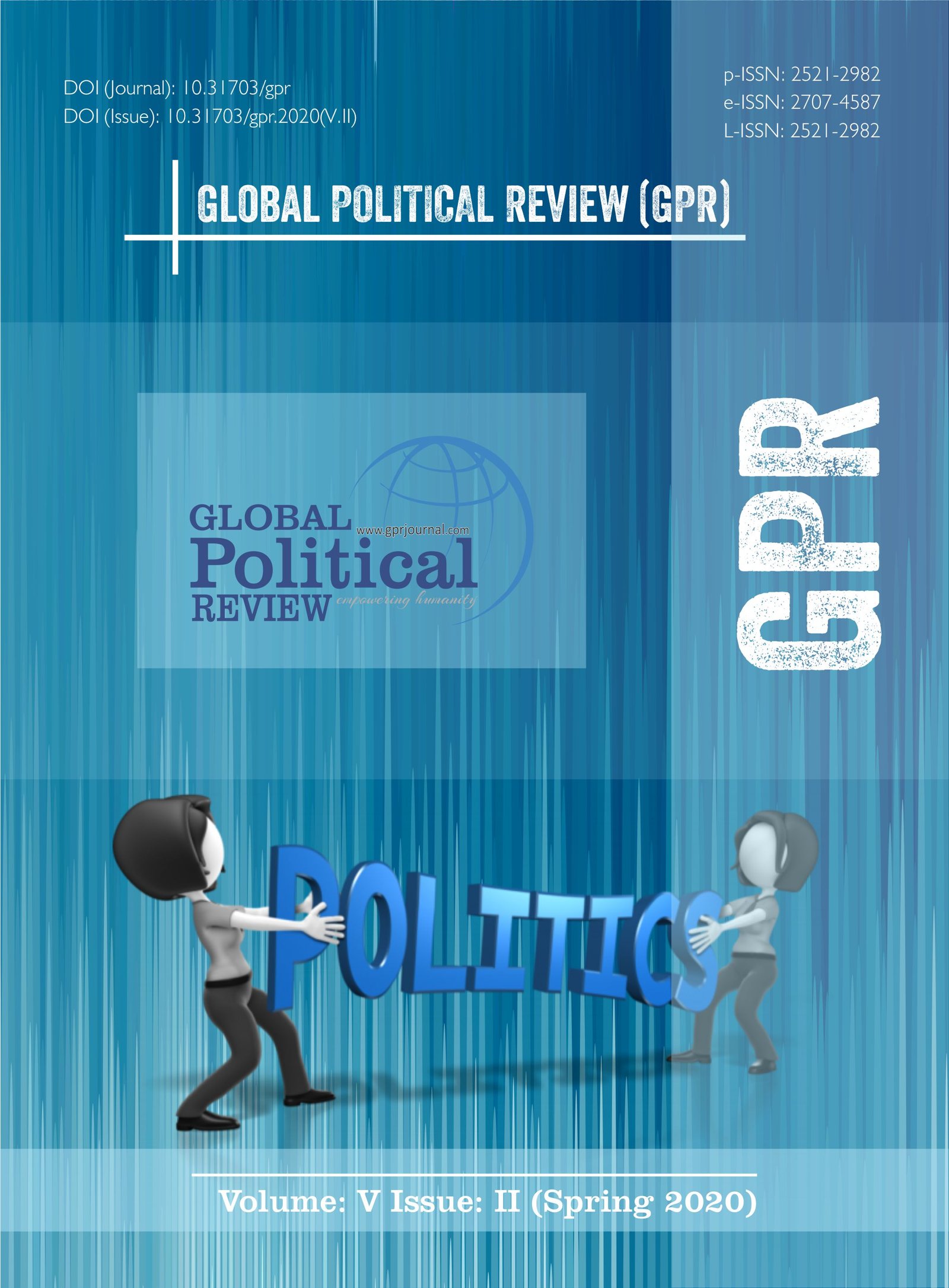 Volume V, Issue II (Spring 2020)
Volume V, Issue II (Spring 2020) 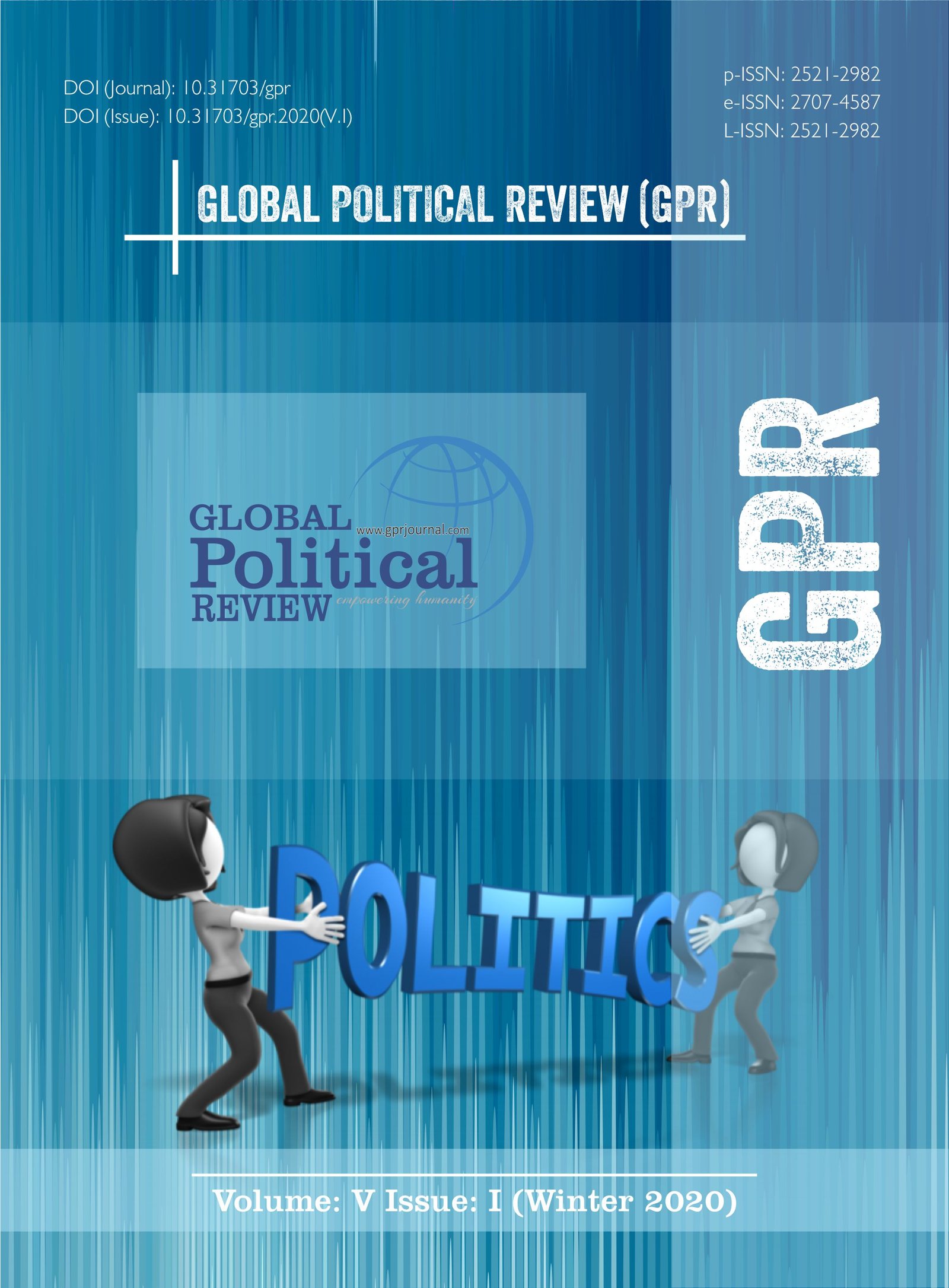 Volume V, Issue I (Winter 2020)
Volume V, Issue I (Winter 2020)  Volume IV, Issue IV (Fall 2019)
Volume IV, Issue IV (Fall 2019)  Volume IV, Issue III (Summer 2019)
Volume IV, Issue III (Summer 2019)  Volume IV, Issue II (Spring 2019)
Volume IV, Issue II (Spring 2019) 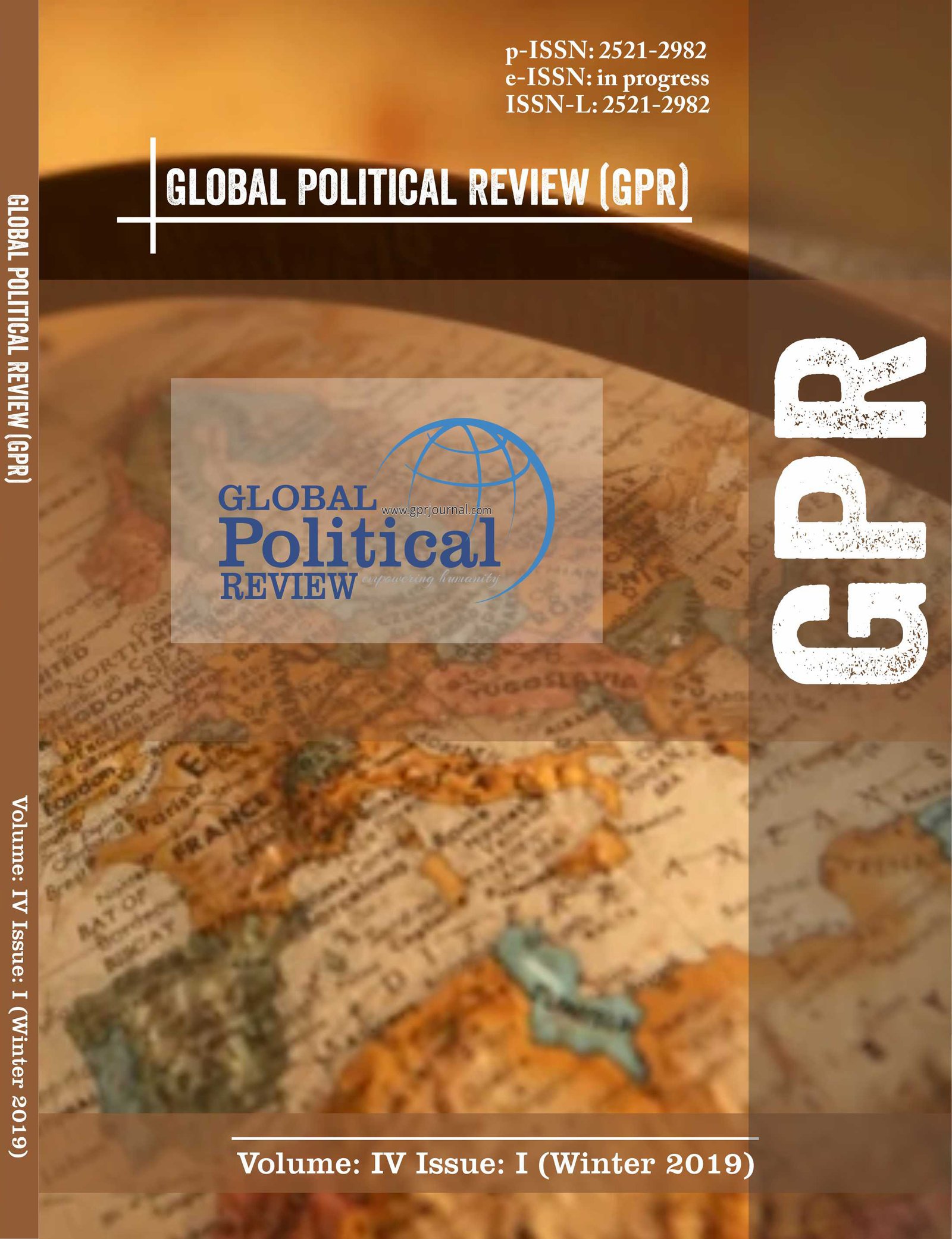 Volume IV, Issue I (Winter 2019)
Volume IV, Issue I (Winter 2019) 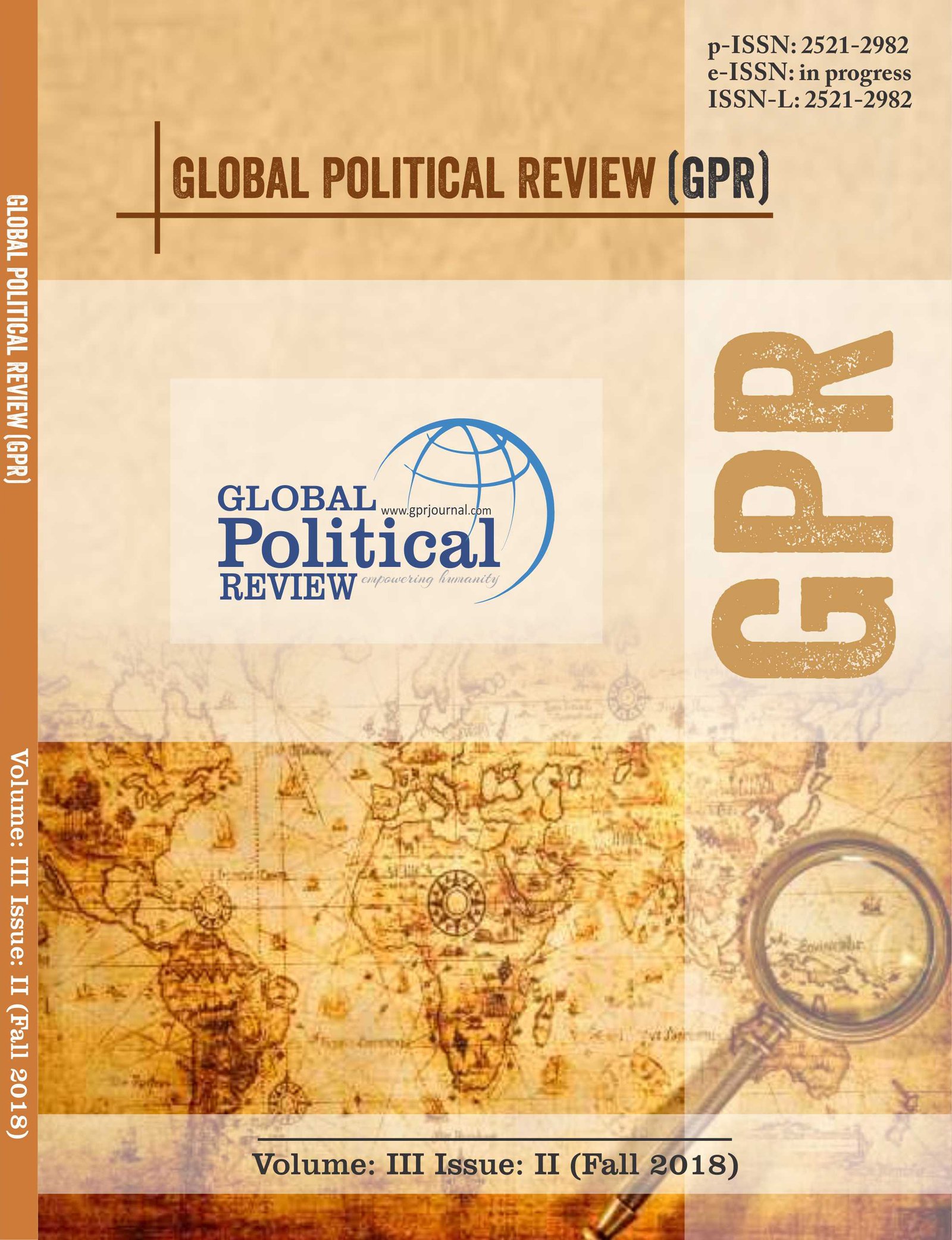 Volume III, Issue II (Fall 2018)
Volume III, Issue II (Fall 2018) 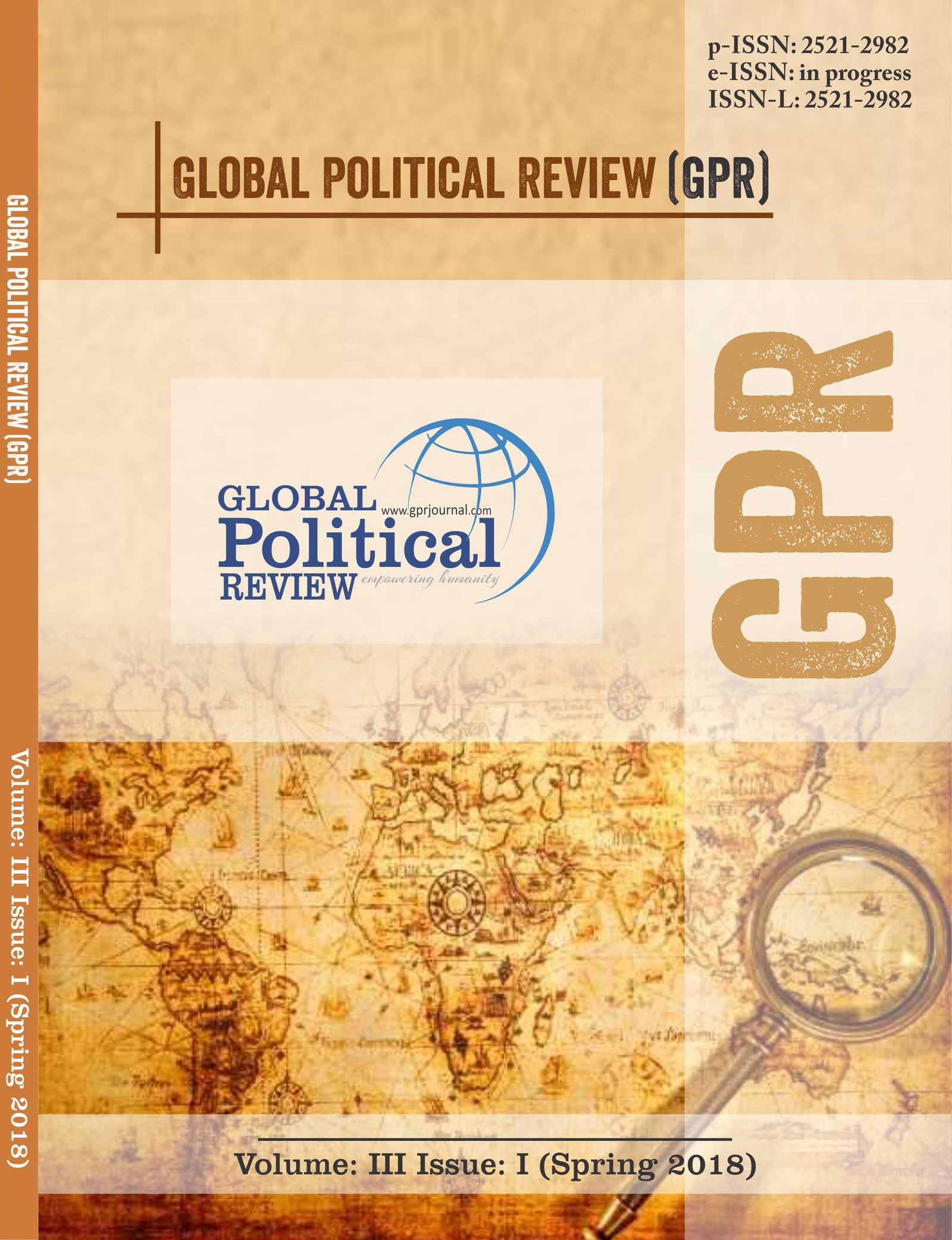 Volume III, Issue I (Spring 2018)
Volume III, Issue I (Spring 2018)  Volume II, Issue I (Fall 2017)
Volume II, Issue I (Fall 2017)  Volume I, Issue I (Fall 2016)
Volume I, Issue I (Fall 2016)